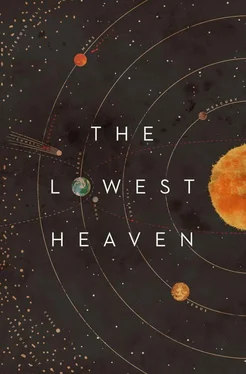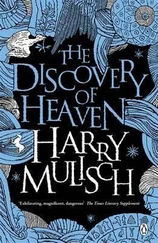Despite our disparate lives, we had found something in common: a series of disastrous relationships. We agreed that Saga had cost us love in our adult lives. We were dysfunctional. We would tell her this.
We were welcomed to the orbiting station above Ceres by a CSSA official. He did not mention Saga, which we thought strange, but invited us to a viewing platform from where we could see the dwarf planet drifting softly below. He brought refreshments, and there he left us. We surveyed Ceres with dubious eyes, knowing this sphere of rock and water was the latest thing to have a hold over our mother. Down there was her version of love. We saw a white planet, a cream planet, a planet with pale lemon sorbet swirls. We saw veined marble; we saw old polished bone. We pointed out to one another the dark spots where smaller asteroids had crashed into the planet’s surface. We pontificated aloud that Saga’s mission would be dangerous, whatever it was. We theorised on likely locations for the mining base. We knew nothing, but believed that we must say something. We had to reassure ourselves of our right to be aboard. We were passengers. We were nervous.
She entered the viewing platform alone. Our mother, the astronaut, in our sights for the first time since our births. There was the tall, lean figure, there were the eyes the colour of an ocean on a stormy day, flecked with recklessness, just like the documentaries said.
As soon as she appeared we knew we had been right to be nervous.
It was clear that Saga was not expecting us. She recognized us in the way that we might recognize a celebrity from a photograph –disorientation, followed by slow comprehension. She looked shocked. Yes, we agreed afterwards that she looked shocked. She said:
What are you doing here?
It was a horrible moment. Taken aback, we rushed to explain. The invitation◦– the transmission! We had replied. Had she not received our replies? We did not like to say, had she not paid for our flights, arranged for our stay, organized all of this?
Gradually the shock faded from her face. Of course, of course. She smiled. But we were thrown, obviously, by this peculiar greeting.
Struck by a terrible shyness, we felt our tongues grow huge and clumsy. How should we introduce ourselves, how should we greet her? We had agreed before that we would address her as Saga, but now alternate possibilities ran through our heads: mamma, mǔqīn, mom. We were stunned by the lean, stark beauty of her face. Her youthfulness shocked us, although we knew, we had read, that she had had no restorative work or even enhancements, as many of the astronauts did, to make them faster, sharper, better. We wondered if she were real; we wondered if she might live forever.
We wondered why she had born us and what we were doing there, but all the things we had planned to say evaporated.
Saga spoke in Mandarin, although Signy swears there was a moment when we all digressed into Scandi.
She said our names.
Ulla, Per, Signy. Look at you! I’m so happy you could come.
(But that moment of shock?)
She asked us questions. She wanted to know about our little, insignificant lives, and all we wanted to know was her, her inner life, her private thoughts. Alone in her ship in the outback of space, did Saga ask the questions we all asked? Did Saga wonder where she came from, if there was a god? We wanted to know, but did not dare to ask.
We did our best to make ourselves interesting; gave her the answers we thought she wanted to hear. The evening passed too quickly. Over dinner, Saga told us about the mission. She told us Ceres would become the most important mining station in the solar system, a source of water and fuel for travellers back to Earth and out to Jupiter and Saturn. We watched the way she held her chopsticks, scooping up noodles with easy elegance. We mirrored her gestures. We were offered wine, but Saga took only water. Her storm-at-sea eyes surveyed us, smiling. We thought she was pleased, and this gave us a feeling of warm satisfaction.
The next day we watched her descend to Ceres. She had her own ship, and it was built, she had told us, to her exact specifications. She gave us some technical details that we did not understand.
We watched Saga’s ship land, and the others of the mission followed. Saga appeared first on the surface link. We watched her suited figure lope across the surface of the planet. In the low gravity she appeared like a mythical being gliding over her territory. The expedition team were to meet with another team stationed on the surface. They had been drilling for samples for some months, and would perform the extractions today. Big results were expected.
Before the astronauts could reach the drilling station, the transmission cut out. There was confusion in the room: what had happened to the link? An engineer came and tried to fix it. She could not get a picture. We watched, silently, hoping everyone would forget we were there, but of course they did not. After a few minutes we were told that there had been a technical mishap (nothing to worry about, only the connection) and were escorted firmly from the room.
We went to the viewing platform and stood about aimlessly. Ceres hung, mute and ghostly against her velvet backdrop. This was how we came to witness Saga’s exit.
We saw a pinpoint of fire, small but distinct on the surface of the pale planet. A brief flare, there then vanished.
We saw a ship emerging from near the point of flare. It grew steadily larger, catching flecks of sunlight, like the carapace of a golden insect. Although there were no identifying markers, we knew, we sensed that it was Saga. We turned to one another, pointing.
Isn’t that–?
Was that an explosion?
It must be–
We watched the lone ship orbit the planet several times, gaining velocity. It was then that we realized what was happening. Saga was preparing to leave. Her ship made one final circuit, before it shot away in the direction of the outer solar system.
We stared without comprehension. On Ceres, a cloud bloomed where the fire had been. Saga was gone.
At first there was media attention. People wanted to interview us. Our pictures were broadcast: Saga’s children, said the captions. Witnesses to her final farewell. That was what they called it, the media. Saga’s final farewell. We thought it wrong: it implied she had said goodbye before, and this was not the case, and she had not said goodbye now, not to us. Saga became a rebel. She had thwarted the CSSA, and some even believed she had caused the explosion, which was the result of unstable gases released by the drilling. There was a warrant for her arrest. Interplanetary outrage was so great that the CSSA backtracked and declared themselves Saga’s eternal ally, and wished her safe travels, wherever she was going. Later it was announced that the whole thing had been a set-up: Saga had been dispatched on a secret mission, known only to the Republic of China. Mars made a bold statement: the truth was that Saga had defected. She was working for another planet now. She was an agent, a double-agent, a triple-agent.
The solar system held its breath, anticipating a dramatic return. Months passed. There was no sign of Saga.
Next the experts appeared. Doctors and psychiatrists spoke to Saga’s colleagues and analysed her state of mind. Fellow astronauts agreed: yes, she had been distracted, yes, there had been lapses. She had fallen prey to star sickness, said the doctors. It happened sometimes, to astronauts. She had been consumed by a kind of madness.
We thought of Signy’s penguins in the Antarctic. Had Saga gone the wrong way?
Our opinions were sought, and discarded (we had little to say). The frenzy passed more quickly than we expected. We are less interesting; not so photogenic as our mother. We lack the thing which makes her magnetic, the reckless spark in the storm-sea eyes. We did not know enough to make a story.
Читать дальше












